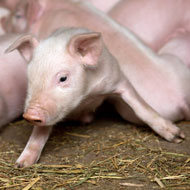
Pig farmers push for sensible transition period
The European Committee for Medicinal Products for Veterinary Use (CVMP) has reached a final decision that the benefit-risk for veterinary medicines containing zinc oxide is negative and that this class of products should be withdrawn.
The European Commission will now begin the formal decision making process and is expected to deliver its final decision sometime after June.
The Veterinary Medicines Directorate (VMD) has submitted evidence to support a proposal for a 10-year transition period if products containing zinc oxide are withdrawn.
This will allow for changes in pig farming practices to avoid increases in the occurrence of diarrhoea at weaning, to ensure animal welfare and prevent increases in the use of antibiotics.
Commenting, NPA chief executive Zoe Davis said she was ‘disappointed but hardly surprised' with the CVMP’s verdict. She explained that the association would now work with EU colleagues to ensure the industry is given enough time to adapt.
“As the Commission rarely go against CVMP advice, we will now need to lobby them hard for a sensible phase out period,” she said.
"While the VMD has submitted its response to the Commission consultation and suggested a 10-year phase-out period following our request, we will need to work with COPA and others to ensure the message is similar across the EU.
"We understand that several countries are in line with us already. We will also be seeking a meeting with the VMD to discuss the evidence on which this decision was made, look at the implications and explore options, particularly post-Brexit."



 RCVS Knowledge has welcomed Professor Peter Cockcroft as editor-in-chief for Veterinary Evidence.
RCVS Knowledge has welcomed Professor Peter Cockcroft as editor-in-chief for Veterinary Evidence.